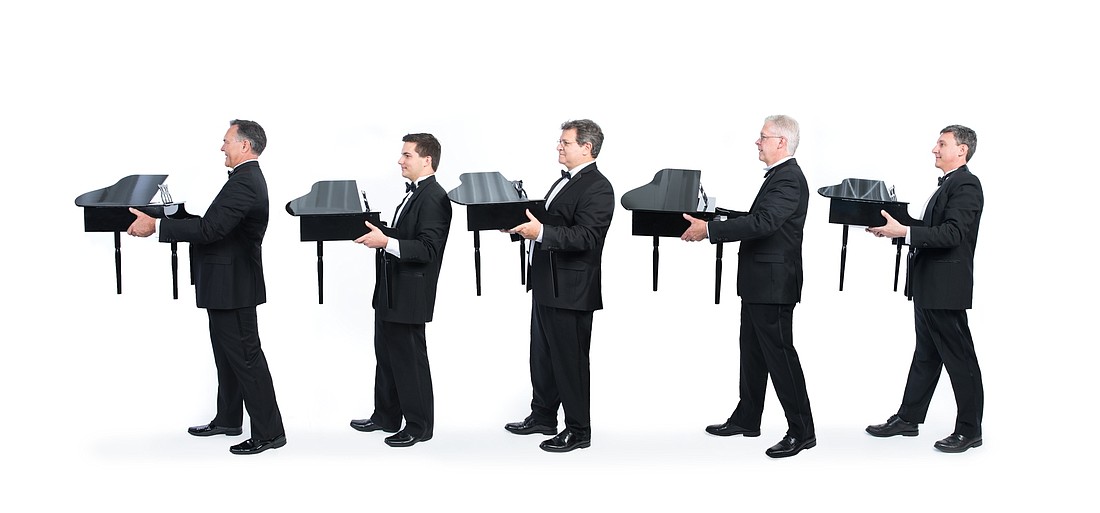- November 25, 2024
-
-
Loading

Loading

Lightning striking twice in the same place may be a phenomenon to most of us, but for the thousand or so people in the Sarasota Opera House Saturday night, it certainly seemed a possibility as “Piano Grand II” opened the 22nd season for Artist Series Concerts of Sarasota with a repeat extravaganza of flying fingers and sumptuous Steinway sounds.
Joseph Holt assembled a quintet of excellent professional pianists from our area: Donald Bryn, Andrew Lapp, Thomas Purviance and Jonathan Spivey, with Holt himself serving as pianist, ringmaster and interlocutor for the evening
And quite an evening it was, providing a musical tour from the Baroque to Hollywood with stops in Spain, Italy, Russia and France and a few well-planned detours along the way.
Most everyone who has studied or played the piano has played a piano duet and a few of the more advanced maybe two pianos or even two pianos-eight hands, but five pianos? Such happenings are rare, and to my knowledge the Five Browns, the talented family of Juilliard-trained pianists, is the only “Gang of Five” appearing regularly these days. So, Sarasota’s Piano Grand is really unique in several ways.
Finding and arranging music suitable for such a cacophony of five keyboards is both a challenge and a treasure hunt, and Holt has again hit pay dirt in his choice of repertoire. Only Maurice Ravel’s “Bolero” failed to re-create that panoply of orchestral timbre and color that serves to charge what is essentially a 15-minute exercise in orchestration and crescendo culminating in that explosive jump in key from C to E major, bringing the piece to its ultimate climax.
Placing and clever removal of blankets over the piano strings helped change the sound during the deliberate pacing of the piece, but the overall effect was confined to that of an unrelenting crescendo, which the five pianists produced aplenty. I just missed Ravel’s continuous parade of orchestral color, even with all the pianistic excitement.
After a rousing performance of the national anthem, the evening began soberly with a setting of the first movement of Johann Sebastian Bach’s Brandenburg Concerto No. 3, followed by Amilcare Ponchielli’s “Dance of the Hours” from “La Gioconda.” My favorite was a wonderful transcription and arrangement of Pyotr Ilyich Tchaikovsky’s “Capriccio Italien” by Jane Tan, longtime faculty member at Towson State University, who has the unique status of being the only person awarded Steinway Artist status solely for her pedagogical skills.
Andrew Lapp, also a Steinway Artist, and the evening’s only soloist, gave a beautifully fluid and lovely performance of “Un sospiro” by Franz Liszt, providing a peaceful respite and contrast to the other works.
While Joseph Holt is well known as a pianist, conductor, interviewer and conveyor of goodwill and humor, he has another talent little noticed until this evening — that of arranger.
Two of the major works of the evening, the “Carmen Fantasy” and “Movie Mayhem” were arranged for five pianos by Holt, showing a facile knowledge of voicing and yes, orchestration for five pianos. While the “Carmen Fantasy” provides us with colorful settings of her greatest hits, “Movie Mayhem” is a clever juxtaposition and intertwining of 28 — yes, 28 — themes from motion pictures. Pieces included the “Warsaw Concerto,” through “Exodus,” “Superman,” “The Sting,” and on and on, weaving just enough of each theme to almost let us identify it before scampering onto another. It gave the audience a treat in trying to locate and remember just which was which.
An off-program birthday tribute to Managing Director John Fischer, newly 100-year-old Betty Schoenbaum and a special donor couple in the audience featured a five-piano arrangement of “Happy Birthday” in the “tragic” style of Beethoven by longtime Victor Borge piano partner Leonid Hambro.
John Philip Sousa’s “Semper Fideles” concluded the evening.
When Holt introduced the concert, he promised a fun evening with something for everyone and a sendoff for the season of Artist Series Concerts. While it wasn’t an evening known for musical subtlety, except for Andrew Lapp’s “Liszt,” it was certainly enjoyed by everyone.